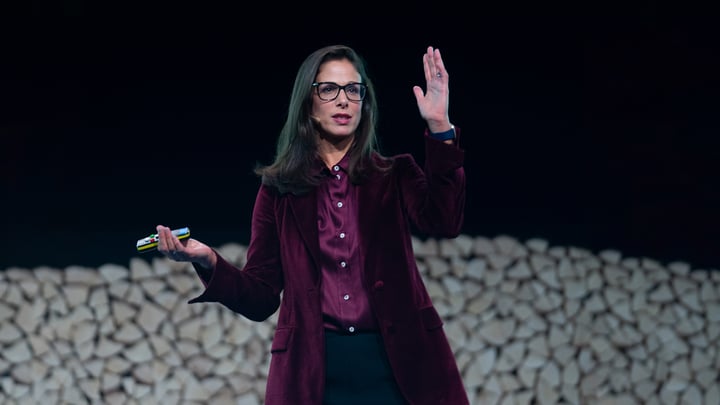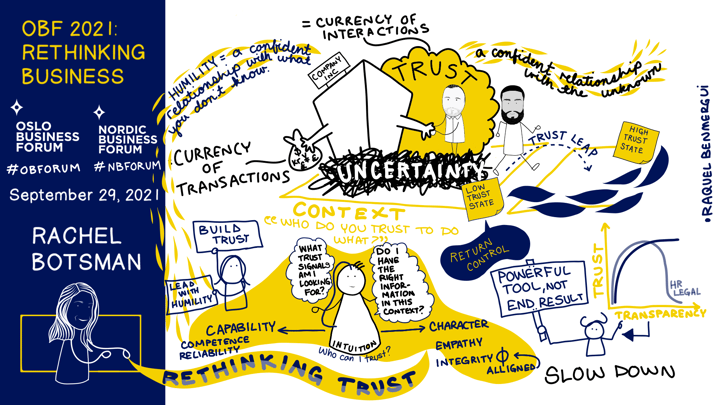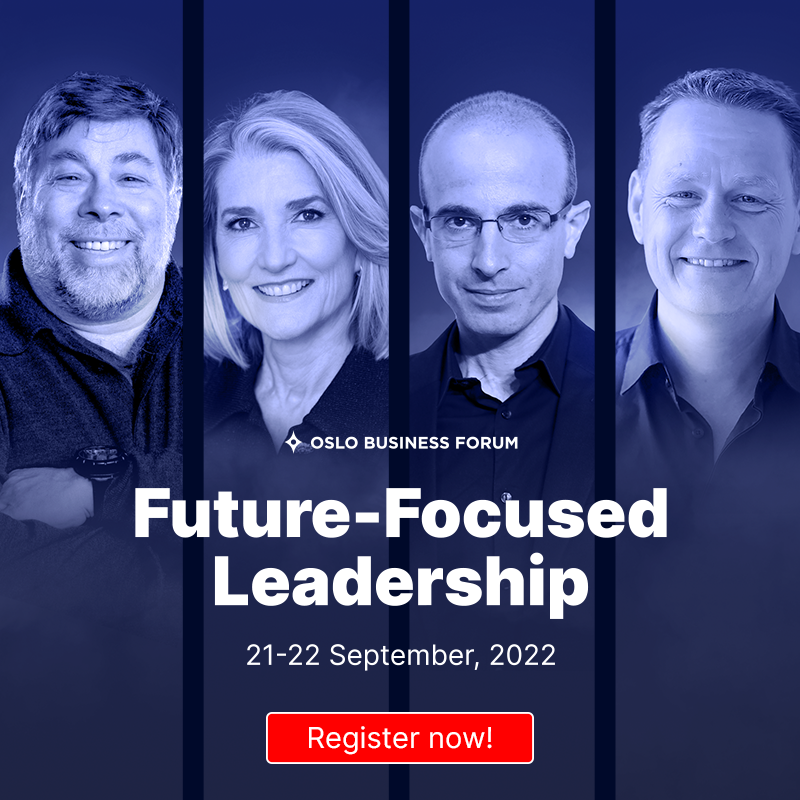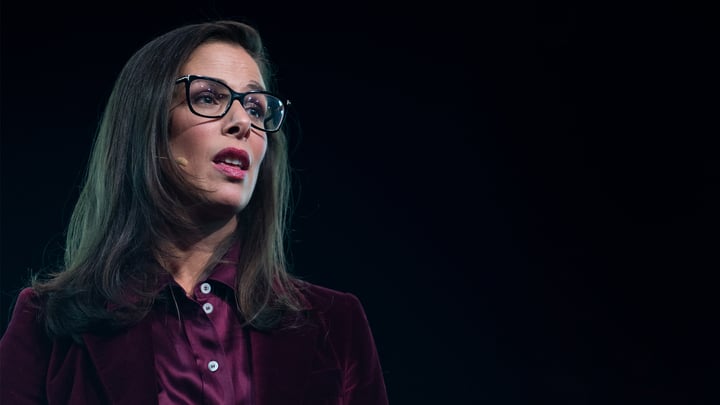Rachel Botsman is a trust expert, author, and lecturer at Oxford University. She is passionate about teaching people to challenge the way they think about trust and humility. She is the author of two critically acclaimed books and has been recognized as one of the world’s most influential management thinkers and a Young Global Leader by the World Economic Forum. In her interactive session at the Oslo Business Forum, Rachel gave leaders clear language and powerful principles to help them think about trust differently.
Trust and Uncertainty
Rachel’s journey began more than a decade ago when she recognized that technology was changing the way people placed trust in one another. Her eyes were opened to how critically important trust is and what it means to our relationships, businesses, and society.
Today, perhaps more than ever, the need for trust has rapidly increased. Faced with uncertainty and coping with the unknown, people are demanding greater trustworthiness from each other, the organizations they do business with, and their leaders.
But the concept of trust is rife with misconceptions—about who we trust, why we trust them, and how trust is built. As a renowned trust expert, Rachel is compelled to challenge leaders to rethink their notions of trust.
“Trust has more definitions than any other sociological concept,” said Rachel. In her view, the best way to describe trust is as a confident relationship with the unknown. She believes that when we view trust in this way, it becomes a remarkable force that helps us navigate uncertainty.
By answering five big questions, Rachel sought to shed new light on the relationship between trust and uncertainty.

Question #1: Who Do You Trust?
Rachel began her session with what may seem like an easy question: Who do you trust?
With a simple, show-of-hands exercise, Rachel asked the audience to rate the companies and leaders they trust most. Then, she asked them to dive a level deeper by saying, “To do what?” At this level, we create the context that helps us better assess where we place our trust and why.
“When we talk about trust in really vague terms, it becomes toxic,” said Rachel. “We need to think about trust in context to make smarter decisions about who we give our trust to.”
When leaders think more critically about who, what, and why they trust, they will also think more clearly about why people place trust in them and their organizations.
The second question Rachel raised is perhaps the most crucial to understand: Why is trust so important?
To answer this question, Rachel asked leaders to think of trust as the conduit through which new ideas travel. It is the impetus for innovation, though change only occurs when we’re willing to make what Rachel has termed “trust leaps.”
“Anytime we ask someone to do something new or do something differently,” Rachel said, “We’re asking them to make a trust leap.”
The way we look at trust leaps depends largely on our environment and our relationship to risk. Trust leaps often accelerate in times of increased uncertainty, and when faced with uncertainty, we naturally resist and gravitate back to the known. Rachel used the pandemic as an example, recalling changes in how we make and accept payments and how we travel and gather. These shifts felt unfamiliar and unknown at first, but gaining greater trust has enabled us to make remarkable leaps into the future.
“Anytime we ask someone to do something
new or do something differently, we’re
asking them to make a trust leap.”
Rachel Botsman at Oslo Business Forum 2021: Rethinking Business
Question #3: Does Transparency Equal More Trust?
The third question Rachel raised is one that is hotly debated in many organizations: Does transparency equal more trust?
Rachel believes there is a mistaken belief that transparency is the antidote to all our trust issues. “I’m not saying transparency in itself is a bad thing,” she said. “There is a time and a place.”
She noted that few organizations can make the promise to be fully transparent. When they do, the expectations of employees and external stakeholders rise dramatically, often in ways the organization did not expect and cannot fulfill.
She warned, too, that transparency can cause leaders to exert toxic control. When we demand full visibility of what our teams are doing, it creates a lack of trust. It’s only when we let go of control that we foster more trust in our relationships and culture.
“Think of transparency as a tool,” said Rachel. “Not as an ideal end state.”
Question #4: How Do You Know If Someone Is Trustworthy?
The fourth question Rachel encouraged leaders to consider is difficult to answer: How do you know if someone is trustworthy?
Rachel acknowledged that most leaders have experienced pain from placing their trust in the wrong person. In most cases, this misplaced trust occurs when we “go with our gut” without having enough or the right information.
Certainly, intuition can be powerful, but Rachel encouraged leaders to use it only where they have deep expertise. In other instances, they must look for trust signals. In studying what makes people trustworthy, sociologists have identified two critical trust signals: capability and character.
Capability refers to how someone does things and is demonstrated in two key traits:
Competence: Do they have skills, time, knowledge, or resources?
Reliability: Will they be honest and behave consistently with their promises?
Character refers to why you do things and is demonstrated in two key traits:
Empathy: Will they provide the support and care that’s needed?
Integrity: Are their motives aligned with our best interests?
Trustworthiness requires both capability and character, but Rachel noted that the most important trust trait is integrity. “This is what everyone is looking for, particularly now,” she said.

Question #5: How Do You Earn Trust As A Leader?
The final question Rachel addressed is one she hears from leaders: How do you earn trust?
Rachel offered thoughtful insight by saying, “The most powerful way to earn trust is … ‘I don’t know.’”
She believes humility is the secret to earning trust. When leaders say “I don’t know,” “I’m not sure,” or “I was wrong,” they accelerate the trust process with honesty. They admit they don’t have the capability or the information to make a decision or provide an answer. And in making this admission, their teams have more confidence in instances when they do offer decisions and direction.
Rachel made a distinction between trust and humility, recalling her definition of trust as a confident relationship with the unknown. “Humility,” she said, “Is a confident relationship with what we don’t know.”
She claims humility is one of the most profound shifts we need to see in organizations in the future. In traveling this journey and navigating increased uncertainty, leaders must continually seek to act with more honesty and earn more trust. “We must move away from a culture of ego and arrogance to a culture of confident humility,” she said.
Leaders’ Call to Action
Rachel left leaders with a clear call to action, encouraging them to do two things with the insights she shared in her session. She asked them to:
- Rethink one thing you thought about trust.
- Identify one thing you can do as a leader to behave in a more trustworthy way.
“If we all start thinking of trust as something we must continually earn and demonstrate,” said Rachel. “We will take care of the state of trust in our relationships, in business, in the world.”
Key Points
- When we view trust as a confident relationship with the unknown, it becomes a remarkable force that helps us navigate uncertainty. Leaders can ask themselves five questions to challenge the way they think about trust.
- Who do you trust? When we think about who we trust, we must consider context by asking, “To do what?”
- Why is trust important? Trust enables us to make leaps into the unknown—but our willingness to take “trust leaps” depends on our environment and relationship to risk.
- Does transparency equal more trust? There is a time and place for transparency, but it will not fix all our trust issues.
- How do you know if someone is trustworthy? The two most important factors in evaluating trustworthiness are capability and character.
- How do I earn trust as a leader? The key to earning trust is to lead with humility.
Questions to Consider
- What did you previously believe about trust that you’re rethinking now?
- What is a recent “trust leap” you made? How did you decide whether or not to take that risk?
- What is your policy on transparency, and how can you use it as a tool to increase trust?
- When you make decisions as a leader, are you more likely to trust your intuition or to seek more information?
- What is one thing you can do as a leader to be more trustworthy?
Early bird tickets now available to Oslo Business Forum 2022: Future-Focused Leadership. Sign up now to secure your spot!
